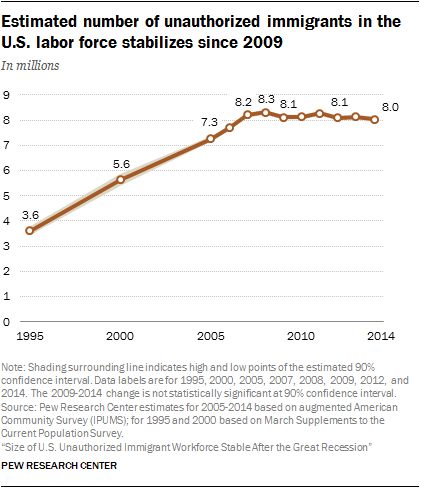The coronavirus outbreak has gripped headlines for weeks, as economies around the world grapple with how to beat it. The U.S. government has responded to the one-two punch of a health crisis and economic meltdown with accelerated drug trials and trillions of dollars in economic stimulus for businesses and Americans alike.
One segment of the population that falls into a gray area, however, is immigrants.
According to Pew Research, roughly 8 million of the country’s 11 million undocumented immigrants participate in the U.S. workforce. It’s not unusual for undocumented immigrants to hold down jobs that are temporary in nature, leaving them to live paycheck to paycheck in the interim.
Incidentally, this wasn’t always the case.
At the start of the 20th century, immigrants often held occupations on par with native-born Americans—compared to now when immigrants tend to earn less than their native-born counterparts.
Today, immigrants are often paid on an hourly basis, generally in cash. And undocumented immigrants disproportionately flock to sectors where the wages are hourly in nature—such as construction, restaurants, agriculture and childcare.
Part-time work already lends itself to job instability—not to mention the fact that there are often no healthcare benefits included in the pay.
African Services Committee co-executive director Kim Nichols works directly with immigrants, like those working in restaurants or as home health care aides who live paycheck to paycheck.
Nichols told NPR, “They don’t have any recourse to backup finance in the event they’re sick. We are very concerned people are working when they shouldn’t be.”
Meanwhile, with the number of states closing non-essential businesses on the rise—including California, New York, New Jersey and Illinois—many of the jobs in these sectors have become obsolete. In New Jersey, unauthorized workers comprise between 6 and 8 percent of the workforce. These individuals won’t qualify for unemployment or other government services.
This is why it’s not overly shocking to learn that chief among the concerns of undocumented immigrants in the U.S. is finances—not coronavirus.
The Coalition for Humane Immigration Rights canvassed 500 individuals, comprised of undocumented immigrants and their relatives, and found that 95 percent were concerned about paying their bills and 89 percent were worried about losing their jobs—compared to 73 percent who cited coronavirus as a concern.
Asylum Landscape

The asylum process has not been unscathed by the coronavirus pandemic either. Before we look at the impact, let’s explore the asylum landscape.
The immigration courts decided nearly 70,000 asylum-related cases in 2019, up from fewer than 20,000 only a half-decade earlier. Meanwhile, the number of immigrants who were granted asylum in the United States skyrocketed from fewer than 10,000 in 2014 to nearly 20,000 in 2019. It didn’t happen overnight—as asylum seekers must wait for roughly three years for a court decision. There are currently 25,000 migrants seeking U.S. asylum in Mexico.
In 2020, however, these numbers are likely to look much different as a result of coronavirus, as the U.S. cracks down on the number of asylum-seeking immigrants allowed entry.
Migrants, including asylum seekers, could be refused at the U.S. border if they are deemed a threat for carrying a communicable disease. If refused, these individuals would be sent to Mexico or Canada or back to their native countries. The U.S. immigration courts remain open for the time being, but it’s a fluid situation changing by the day.
Canada has tightened its immigration rules as well, declaring that it would return asylum seekers flocking to its border from the United States. Prime Minister Justin Trudeau said the measure would be in place until the coronavirus pandemic is over.
Meanwhile, a scientific study published by Science Advances revealed that asylum seekers are not a burden on the economy: Instead, asylum seekers bolster economic output and have a positive effect on unemployment numbers, lifting GDP and net tax revenues by about 1 percent.
Economic Impact from Coronavirus
While it’s too soon to say for sure the impact that the coronavirus pandemic will have on the U.S. economy, the early predictions are alarming. J.P. Morgan, for instance, is calling for a global recession after the “longest economic expansion on record” comes to a grinding halt.
The firm expects that the U.S. economy will shrink by 14 percent in the second quarter as a direct result of the virus. They also expect the economy to contract by 4 percent in the first quarter.
By the second half of the year, however, the outlook begins to improve, with estimates for the economy to expand in the third and fourth quarters by 8 percent and 4 percent, respectively.
The damage to the unemployment rate will be acute for developed economies, including the United States, where economists predict jobless claims will surpass 400,000 in the near term.
The anticipated slowdown in immigration and refugee activity likely won’t help. One peer review suggests comparing the effect of immigrants on the economy from 1850-1920 to recent history, concluding that immigrants produce both “winners and losers” among native-born Americans, both then and today.
Historically speaking, the arrival of immigrants has fueled capital investment into things such as factories for mass production.
Of course, the coronavirus pandemic is a modern-day crisis, one whose impact on both U.S. immigration and the economy has yet to be realized.
The coronavirus pandemic and the response by federal, state and local authorities is fast-moving.
During this time, Ms. is keeping a focus on aspects of the crisis—especially as it impacts women and their families—often not reported by mainstream media.
If you found this article helpful, please consider supporting our independent reporting and truth-telling for as little as $5 per month.






